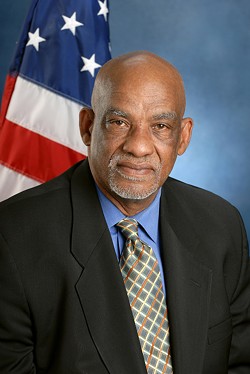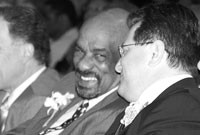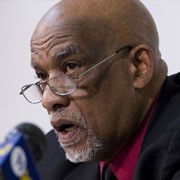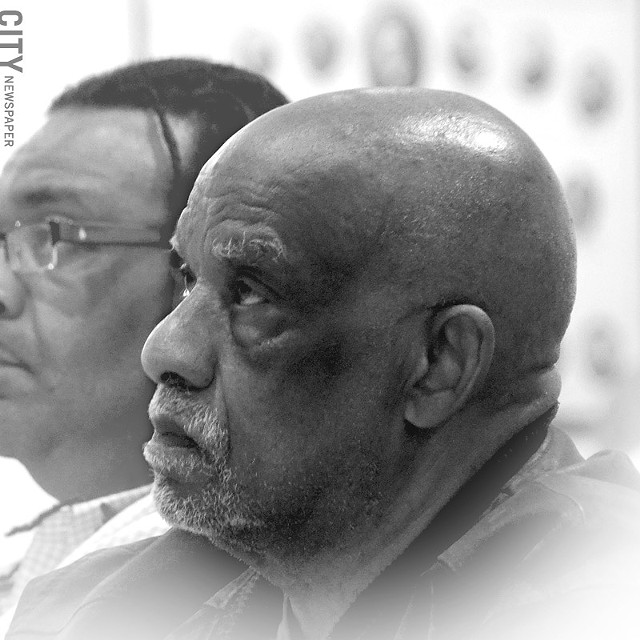[
{
"name": "500x250 Ad",
"insertPoint": "5",
"component": "15667920",
"parentWrapperClass": "",
"requiredCountToDisplay": "1"
}
]
Assemblyman David Gantt, who represented Rochester in the New York State Legislature for nearly 40 years as a man who knew poverty and power in equal measure, died Wednesday. He was 78.
The death of Gantt, who had been battling kidney disease, was announced late Wednesday afternoon in a statement from his office that evoked his mother, a tireless crusader for the poor.
“Assemblyman Gantt was one of Rochester’s foremost civil rights pioneers,” the statement read, “who carried on the legacy of his mother, Lena Mae Gantt, in fighting unapologetically on behalf of poor people in the greater Rochester community for over 45 years.”
The statement read that details on arrangements for a memorial service would be forthcoming.
Gantt had wrestled with health problems for years, but his condition had been precarious since at least 2017, when he announced that he had kidney failure and was hoping to get a transplant.
As he underwent treatment in the years since, much of it from his longtime home on Lyndhurst Street, Gantt was seen sparingly in Albany, missing most of the days in the legislative sessions. He formally announced earlier this year that he would not seek re-election.
Although physically absent, his presence was felt in the Capitol, where he chaired the powerful Transportation Committee for decades, and in Democratic politics in Monroe County, where his influence and imprint is visible from street corners to City Hall.
Rochester Mayor Lovely Warren, who Gantt mentored and for whom he outwardly and unabashedly wore his affection, said in a statement he “was a father to me.”
“He loved me unconditionally and inspired me to be whom I am today,” Warren said. “He saw something deep within me and did everything he could to help me, and countless others, achieve their dreams. . . . He may be gone but he will never be forgotten.”
Gantt was born one of five children to Lena Gantt in Alabama on September 12, 1941. He grew up poor and dependent on public assistance. His father died when he was boy, and Gantt has said his mother relocated to Rochester in 1952 because the social service system in New York was more robust and more helpful to a family like hers than in the Deep South.
He graduated from Franklin High School, where he played basketball competitively, and attended Roberts Wesleyan College in the early 1960s but never graduated, having been forced to leave because he could not pay the tuition.
It was around that time that his mother had begun to make a name for herself as a community activist. She was said to have had a knack for wearing down powerful people through her perseverance and compassion for people who were too downtrodden to fight for themselves.
Lena Gantt fought for parks, affordable housing, health care, and civil rights, and was instrumental in launching anti-poverty organizations like Action for A Better Community and the Anthony L. Jordan Health Center, where her son eventually became an administrator and entered politics.
Gantt was elected to the Monroe County Legislature in 1974, and later, a year after the death of his mother, to the state Assembly in 1983, becoming the first Black person from Monroe County elected to a state office.
He had told the Democrat and Chronicle in 1986 that he owed his political career to his mother, not only because “she made the decision for me” to run in his first campaign, but because of her good name in the neighborhood.
Gantt recounted knocking on doors to encourage residents to register to vote and vote for him. A woman on Draper Street refused and Gantt recalled the interaction this way: “She asked me, ‘Who are you?’ I said, ‘I’m David Gantt.’ ‘Are you Lena’s boy?’ she said. When I said yes she said, ‘OK, we’ll register.’ And she came out of the house with six or seven other people who registered.
“As I walk door-to-door to this day,” Gantt went on, “I still have to live under the roof of my mother. People still remember Lena. They still remember who she was at what she stood for.”
In Albany, Gantt grew in stature over time through attrition to earn the moniker of “dean” of the Rochester delegation to the Capitol.
He left his mark on legislation concerning the development of affordable housing, transportation infrastructure, and the promotion of minority-owned businesses.
He authored bills that became laws that extended the use of ignition interlock systems in DWI cases, that expanded the state 65-m.p.h. speed limit, and that required newly constructed public theaters, auditoriums, and meeting places to be equipped with systems for people with hearing impairments.
Perhaps his most noteworthy political accomplishment, however, was the inspiration and mentoring he provided to a host of Black political operators who became active, and in some cases were elected to office, in his wake.
Gantt's proteges are running elections boards, holding city, state, and county offices, overseeing the Monroe County Democratic Party, and working the electorate door to door.
A profile in CITY in 2012 summed Gantt up this way:
“To his political allies, Gantt is an old-school politician: instinctual, generous to his supporters, and as fierce as a lion protecting his den. But to his critics, Gantt is a career politician, known as much for his mercurial temperament as his statesmanship. He's crafty, and he can be intimidating. He doesn’t take criticism well, and he has no qualms about confronting his opponents. He is infamous for losing his temper with reporters.
“But whether you admire, fear, or revile him, there’s no denying that the enigmatic Gantt is a giant and a pioneer. He didn’t open the door to politics for African Americans and other minorities in Monroe County — he helped kick it down.”
Rochester City Council President Loretta Scott, who knew Gantt for more than 50 years, called him a “transformative leader, a civil rights pioneer, and a fierce advocate for equity.”
“As the first Black leader from Monroe County elected to state office, David changed the landscape of our community and gave a voice to the disenfranchised,” Scott said.
Gantt’s public service was not without controversy, however.
He had held fast to a longstanding position of opposing red-light and anti-speeding cameras until 2008, when he introduced a bill authorizing the use of traffic enforcement cameras that was so narrowly worded as to effectively steer contracts to a company that lobbied for the legislation with the help of a former Gantt aide.
Gantt amassed several residential properties in his district, houses that he let out to friends, political allies, and everyday people who were said to sometimes fall short on the rent.
In turn, Gantt would periodically fall behind on property taxes on some of the houses, landing his name on delinquent lists and earning him the scorn of critics and newspaper columnists.
His relationship with the media could be described as tenuous at best and tortured at worst. He could come off as gruff, cantankerous, and self-righteous in the press, although he rarely failed to answer or return a call from a reporter.
The persona he had assumed in the press was a stark departure from that he was known to assume in private. Those closest to him often referred to his warmth, affection, compassion, and modesty.
In 2010, when local dignitaries gathered at a recreation center on North Street where Gantt had played as a boy for a ceremony to renaming the place the David F. Gantt Community Center, one of the most touching stories about him was told by Warren, then the City Council president.
She told of having been diagnosed with a rare kidney disease when she was in law school and that it was suggested she drop out because she may not live. She said Gantt encouraged her to stay in school and offered her a job in his office to make ends meet. “We’ll make it work for you,” she recalled him saying.
When he took the microphone to accept his recognition that day, Gantt acknowledged his frankness was sometimes a curse and a blessing.
“I’ve had a tendency to say what I believe. But even when I had political fights with people, they became friends,” he said. “I’ve always believed the community center should be a place for everyone because everyone deserves to be served.”
David Andreatta is CITY’s editor. He can be reached at [email protected].
The death of Gantt, who had been battling kidney disease, was announced late Wednesday afternoon in a statement from his office that evoked his mother, a tireless crusader for the poor.
“Assemblyman Gantt was one of Rochester’s foremost civil rights pioneers,” the statement read, “who carried on the legacy of his mother, Lena Mae Gantt, in fighting unapologetically on behalf of poor people in the greater Rochester community for over 45 years.”
The statement read that details on arrangements for a memorial service would be forthcoming.
Gantt had wrestled with health problems for years, but his condition had been precarious since at least 2017, when he announced that he had kidney failure and was hoping to get a transplant.
As he underwent treatment in the years since, much of it from his longtime home on Lyndhurst Street, Gantt was seen sparingly in Albany, missing most of the days in the legislative sessions. He formally announced earlier this year that he would not seek re-election.
Although physically absent, his presence was felt in the Capitol, where he chaired the powerful Transportation Committee for decades, and in Democratic politics in Monroe County, where his influence and imprint is visible from street corners to City Hall.
Rochester Mayor Lovely Warren, who Gantt mentored and for whom he outwardly and unabashedly wore his affection, said in a statement he “was a father to me.”
“He loved me unconditionally and inspired me to be whom I am today,” Warren said. “He saw something deep within me and did everything he could to help me, and countless others, achieve their dreams. . . . He may be gone but he will never be forgotten.”
Gantt was born one of five children to Lena Gantt in Alabama on September 12, 1941. He grew up poor and dependent on public assistance. His father died when he was boy, and Gantt has said his mother relocated to Rochester in 1952 because the social service system in New York was more robust and more helpful to a family like hers than in the Deep South.
He graduated from Franklin High School, where he played basketball competitively, and attended Roberts Wesleyan College in the early 1960s but never graduated, having been forced to leave because he could not pay the tuition.
It was around that time that his mother had begun to make a name for herself as a community activist. She was said to have had a knack for wearing down powerful people through her perseverance and compassion for people who were too downtrodden to fight for themselves.
Lena Gantt fought for parks, affordable housing, health care, and civil rights, and was instrumental in launching anti-poverty organizations like Action for A Better Community and the Anthony L. Jordan Health Center, where her son eventually became an administrator and entered politics.
Gantt was elected to the Monroe County Legislature in 1974, and later, a year after the death of his mother, to the state Assembly in 1983, becoming the first Black person from Monroe County elected to a state office.
He had told the Democrat and Chronicle in 1986 that he owed his political career to his mother, not only because “she made the decision for me” to run in his first campaign, but because of her good name in the neighborhood.
Gantt recounted knocking on doors to encourage residents to register to vote and vote for him. A woman on Draper Street refused and Gantt recalled the interaction this way: “She asked me, ‘Who are you?’ I said, ‘I’m David Gantt.’ ‘Are you Lena’s boy?’ she said. When I said yes she said, ‘OK, we’ll register.’ And she came out of the house with six or seven other people who registered.
“As I walk door-to-door to this day,” Gantt went on, “I still have to live under the roof of my mother. People still remember Lena. They still remember who she was at what she stood for.”
In Albany, Gantt grew in stature over time through attrition to earn the moniker of “dean” of the Rochester delegation to the Capitol.
He left his mark on legislation concerning the development of affordable housing, transportation infrastructure, and the promotion of minority-owned businesses.
He authored bills that became laws that extended the use of ignition interlock systems in DWI cases, that expanded the state 65-m.p.h. speed limit, and that required newly constructed public theaters, auditoriums, and meeting places to be equipped with systems for people with hearing impairments.
Perhaps his most noteworthy political accomplishment, however, was the inspiration and mentoring he provided to a host of Black political operators who became active, and in some cases were elected to office, in his wake.
Gantt's proteges are running elections boards, holding city, state, and county offices, overseeing the Monroe County Democratic Party, and working the electorate door to door.
A profile in CITY in 2012 summed Gantt up this way:
“To his political allies, Gantt is an old-school politician: instinctual, generous to his supporters, and as fierce as a lion protecting his den. But to his critics, Gantt is a career politician, known as much for his mercurial temperament as his statesmanship. He's crafty, and he can be intimidating. He doesn’t take criticism well, and he has no qualms about confronting his opponents. He is infamous for losing his temper with reporters.
“But whether you admire, fear, or revile him, there’s no denying that the enigmatic Gantt is a giant and a pioneer. He didn’t open the door to politics for African Americans and other minorities in Monroe County — he helped kick it down.”
Rochester City Council President Loretta Scott, who knew Gantt for more than 50 years, called him a “transformative leader, a civil rights pioneer, and a fierce advocate for equity.”
“As the first Black leader from Monroe County elected to state office, David changed the landscape of our community and gave a voice to the disenfranchised,” Scott said.
Gantt’s public service was not without controversy, however.
He had held fast to a longstanding position of opposing red-light and anti-speeding cameras until 2008, when he introduced a bill authorizing the use of traffic enforcement cameras that was so narrowly worded as to effectively steer contracts to a company that lobbied for the legislation with the help of a former Gantt aide.
Gantt amassed several residential properties in his district, houses that he let out to friends, political allies, and everyday people who were said to sometimes fall short on the rent.
In turn, Gantt would periodically fall behind on property taxes on some of the houses, landing his name on delinquent lists and earning him the scorn of critics and newspaper columnists.
His relationship with the media could be described as tenuous at best and tortured at worst. He could come off as gruff, cantankerous, and self-righteous in the press, although he rarely failed to answer or return a call from a reporter.
The persona he had assumed in the press was a stark departure from that he was known to assume in private. Those closest to him often referred to his warmth, affection, compassion, and modesty.
In 2010, when local dignitaries gathered at a recreation center on North Street where Gantt had played as a boy for a ceremony to renaming the place the David F. Gantt Community Center, one of the most touching stories about him was told by Warren, then the City Council president.
She told of having been diagnosed with a rare kidney disease when she was in law school and that it was suggested she drop out because she may not live. She said Gantt encouraged her to stay in school and offered her a job in his office to make ends meet. “We’ll make it work for you,” she recalled him saying.
When he took the microphone to accept his recognition that day, Gantt acknowledged his frankness was sometimes a curse and a blessing.
“I’ve had a tendency to say what I believe. But even when I had political fights with people, they became friends,” he said. “I’ve always believed the community center should be a place for everyone because everyone deserves to be served.”
David Andreatta is CITY’s editor. He can be reached at [email protected].













